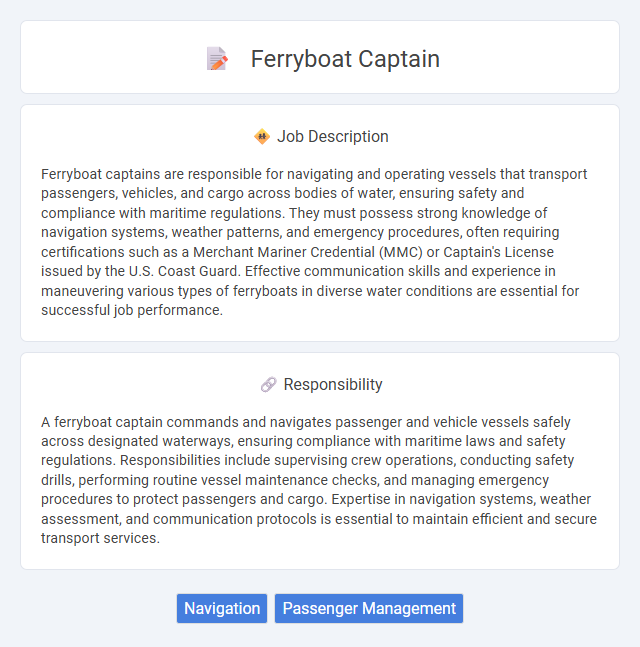
Ferryboat captains are responsible for navigating and operating vessels that transport passengers, vehicles, and cargo across bodies of water, ensuring safety and compliance with maritime regulations. They must possess strong knowledge of navigation systems, weather patterns, and emergency procedures, often requiring certifications such as a Merchant Mariner Credential (MMC) or Captain's License issued by the U.S. Coast Guard. Effective communication skills and experience in maneuvering various types of ferryboats in diverse water conditions are essential for successful job performance.
Individuals with strong leadership skills, a calm demeanor, and the ability to remain focused under pressure are likely to find success as ferryboat captains. Those who enjoy working on the water and have a passion for navigation may be particularly well-suited for this job, while candidates who struggle with long hours or adverse weather conditions might find it challenging. Physical stamina and good communication skills could also significantly influence one's compatibility with this demanding role.
Qualification
Ferryboat captains must possess a valid captain's license issued by a maritime authority, such as the U.S. Coast Guard's Merchant Mariner Credential (MMC) or equivalent certification internationally. Comprehensive knowledge of navigation, maritime safety regulations, and vessel operation is essential for managing passenger and cargo transport efficiently. Prior experience in piloting vessels, strong leadership skills, and completion of specialized maritime training programs significantly enhance a candidate's qualifications for this role.
Responsibility
A ferryboat captain commands and navigates passenger and vehicle vessels safely across designated waterways, ensuring compliance with maritime laws and safety regulations. Responsibilities include supervising crew operations, conducting safety drills, performing routine vessel maintenance checks, and managing emergency procedures to protect passengers and cargo. Expertise in navigation systems, weather assessment, and communication protocols is essential to maintain efficient and secure transport services.
Benefit
Ferryboat captains likely enjoy benefits such as competitive salaries and comprehensive health insurance, supporting their well-being and financial stability. Opportunities for retirement plans and paid time off probably contribute to a balanced work-life schedule. Access to professional development and training programs may enhance career advancement and job security in this maritime role.
Challenge
Ferryboat captain positions likely pose significant challenges related to navigating unpredictable weather conditions and managing passenger safety consistently. The role probably demands high levels of situational awareness and quick decision-making to handle emergencies effectively. Maintaining strict adherence to maritime regulations while ensuring timely operations may increase the complexity of daily responsibilities.
Career Advancement
Ferryboat captains gain career advancement through accumulating extensive maritime experience, obtaining advanced certifications such as the Master Mariner license, and demonstrating leadership in vessel operations. Progression often leads to senior roles like port captain or fleet manager, overseeing multiple vessels and coordinating large-scale maritime logistics. Continuous training in navigation technology and safety regulations enhances promotion opportunities within ferry companies and maritime organizations.
Key Terms
Navigation
Ferryboat captains must expertly navigate coastal waters, rivers, and busy harbors, ensuring passenger and cargo safety while adhering to maritime regulations. They use advanced navigation systems, such as radar, GPS, and electronic chart displays, to plot courses and avoid hazards. Skilled knowledge of tides, weather patterns, and vessel handling is essential for precise maneuvering and efficient ferry operation.
Passenger Management
Ferryboat captains play a crucial role in passenger management by ensuring the safe boarding, seating, and disembarking of all travelers. They coordinate with crew members to maintain clear communication, uphold safety protocols, and respond to passenger needs during the voyage. Effective passenger management by a ferryboat captain directly influences the overall safety and satisfaction of ferry service operations.
 kuljobs.com
kuljobs.com